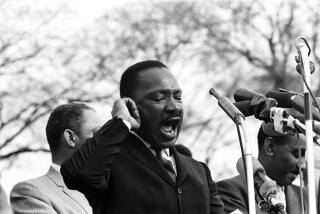For Those Who Knew Hussein, His Graciousness Lives Forever
- Share via
WASHINGTON — For almost half a century, he was known as the PLK--Plucky Little King.
It was not a sign of irreverence or ridicule directed at his diminutive size. The familiarity instead reflected the great admiration of virtually everyone who came into contact with Jordan’s King Hussein.
In an era when monarchies are otherwise in demise, he was the Everyman King, as accessible to his people and the press as he was to prime ministers and presidents. We all really meant, “Long live the King,” because behind that deep, authoritative voice speaking in that clipped, blue-blood British accent was an impish smile, a zest for adventure, even a little mischief, and a profound humility.
He was certainly among the least pretentious of the world’s royals, despite protocol officials at his Amman palace cautioning visitors about turning their backs on the king or crossing their legs so that the soles of their feet faced him. “Don’t worry about them,” the king told me the first time I interviewed him. “They’re well intentioned.” And he chuckled.
The king’s warmth was genuine. After the 1994 peace accord with Israel, Bill and Hillary Rodham Clinton hosted a formal reception for the signatories at the State Department. The receiving line was telling. Israeli Prime Minister Yitzhak Rabin, the no-nonsense former general, clearly wasn’t much interested in the fanfare and shook hands perfunctorily. President Clinton was basking in the limelight of a major foreign policy success, chatting with everyone in line. Hillary Clinton was coolly hurrying up the procession her husband had slowed down, barely acknowledging those like me she didn’t know.
King Hussein was next. It was his moment of honor, an event capping decades of determined and secret diplomacy.
“Ah, Robin, how are you?” he began, before I could offer congratulations on the peace accord. “We haven’t seen you in Amman lately. When are you coming to visit? And how’s your family?”
Hillary Clinton leaned over momentarily to see if perhaps I might be someone interesting or important. I wasn’t, of course. But the king had a way of making those around him feel they were of value and worth knowing.
His sense of humanity was central to his greatest achievements.
In the world’s most volatile region, the Jordanian monarch was perhaps the only man not over-whelmed by the politics of hate. He dared to meet secretly, and often more than once, with every Israeli leader save Menachem Begin--and only because Begin backed out.
“What a wonderful discovery it is to find out that people across that barrier feel the same way, have the same fears, have the same hopes, have the same suffering,” he told me in a 1996 interview.
In a region of intransigent politicians and radical politics that almost cost him his life in repeated assassination attempts, the Jordanian monarch was an enduring optimist. His grand vision extended beyond both his own legacy and his own time.
“There is no alternative to peace for any of us,” he told me. “We would be failing not only ourselves, but we would be failing all future generations if we do not seize this opportunity.”
And in a region holding out against democracy, King Hussein began gradually transforming a poor desert kingdom with a predominantly tribal and nomadic society into a modern pluralist political state. Since the late 1980s, Jordan has conducted three multi-party elections for its new parliament.
“The clock can’t be turned back. Popular participation is the best way to achieve our political objectives,” he said.
His parting words to me were prescient. “Jordan was once a country that people said could not survive. But now we are an example for others. I hope others will come and build on our democratic experiment. We have every reason to believe that we can eventually achieve what happened in Europe--and more,” he said.
“But it’s also not something that will happen in a single lifetime.”
Despite his passion for peace, King Hussein was no political angel. He was prepared to shed blood. He went to war with Israel in 1967, a deadly mistake that cost his kingdom the strategic West Bank and historic Jerusalem in a mere six days of fighting.
He fought with Arabs, both neighboring Syria and Yasser Arafat’s Palestine Liberation Organization, which he ended up booting out of Jordan. He also was prepared to use a firm hand--very firm, if need be--at home. Despite the new parliament, he usually had the last word.
And he made serious political mistakes, most recently by siding with Iraqi President Saddam Hussein during the 1990-91 Persian Gulf crisis. He later reversed course and called for the Iraqi despot’s ouster. His enduring relationship with the United States also often cost him stature in the Arab world.
Yet the Hashemite king was still more warmly embraced than any other contemporary Mideast leader. And even in his mistakes, his detractors often conceded that the king was probably well-intentioned.
Wright, a staff writer in The Times’ Washington Bureau, has covered events in the Middle East for 25 years.
More to Read
Sign up for The Wild
We’ll help you find the best places to hike, bike and run, as well as the perfect silent spots for meditation and yoga.
You may occasionally receive promotional content from the Los Angeles Times.






